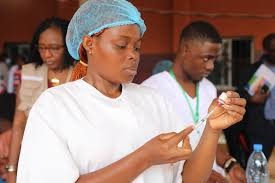Fifty million Lives Saved in Africa by Expanded Immunization Programme (2-2)

WHO
Through Gavi, an alliance of immunization partners including WHO and UNICEF established in 2000 to expand the impact of the EPI, countries are supported to deliver vaccines against vaccine-preventable diseases including others such as cervical cancer and malaria, and to respond to outbreaks of diseases such as Ebola and cholera.
“The evidence is clear: vaccines are one of the most impactful and cost-effective investments in health and development in history. Over the past two decades, Gavi has worked with 40 African countries to expand immunisation coverage while delivering new innovations like the HPV and malaria vaccines and responding to deadly outbreaks – saving millions of lives and generating billions in economic benefits,” said Thabani Maphosa, Managing Director of Country Programmes Delivery at Gavi, the Vaccine Alliance. “With climate change, crises and the threat of infectious disease on the rise it is more important than ever that governments invest in immunisation to help ensure everyone, everywhere has an equal opportunity for a safe and healthy future.”
While progress in vaccine coverage has been made, the region still faces challenges in achieving and sustaining high immunization coverage rates for most of the vaccine-preventable diseases. There are also challenges in ensuring equitable vaccine access across the continent with a significant number of children yet to receive a single dose of life-saving vaccines while others not receiving enough doses.
In addition, the disruptive impact of COVID-19 further strained immunization efforts. The region is yet to fully recover from the pandemic’s disruptions to immunization.
In 2022, coverage for the first and third doses of the diphtheria–tetanus–pertussis-containing vaccine (DTP1 and DTP3, respectively) and the first dose of the measles-containing vaccine (MCV1) in the region was estimated at 80%, 72% and 69%, respectively (all below the 2019 level). Only 13 of the 47 countries in the region achieved the global target coverage of 90% or above with DTP3 in 2022.
Efforts to address gaps in immunization coverage have been intensified through the “Big Catch-Up” initiative that aims to reach children who have been underserved or missed by routine vaccination programmes. Innovative initiatives such as the Zero-dose Immunization Programme have also been established to reach communities that are living in conflict and fragile areas with essential health services.
Further efforts are needed to accelerate progress to meet the goals of Immunization Agenda 2030, a strategy endorsed during the WHO World Health Assembly in 2020, which seeks to reduce mortality and morbidity from vaccine-preventable diseases, ensure equitable access to vaccines and strengthen immunization within primary health care. A regional framework to implement the Immunization Agenda has been adopted.
To sustain progress key strategies need to be implemented. These include controlling protracted and frequent outbreaks of vaccine-preventable diseases; increasing investment in health systems and infrastructure for effective vaccine delivery; enhancing surveillance systems to respond swiftly to outbreaks; addressing vaccine hesitancy and misinformation; bolstering domestic funding for immunization programmes; increasing the use of innovation and technology for better vaccine delivery; and investing in research and development for vaccine development.



